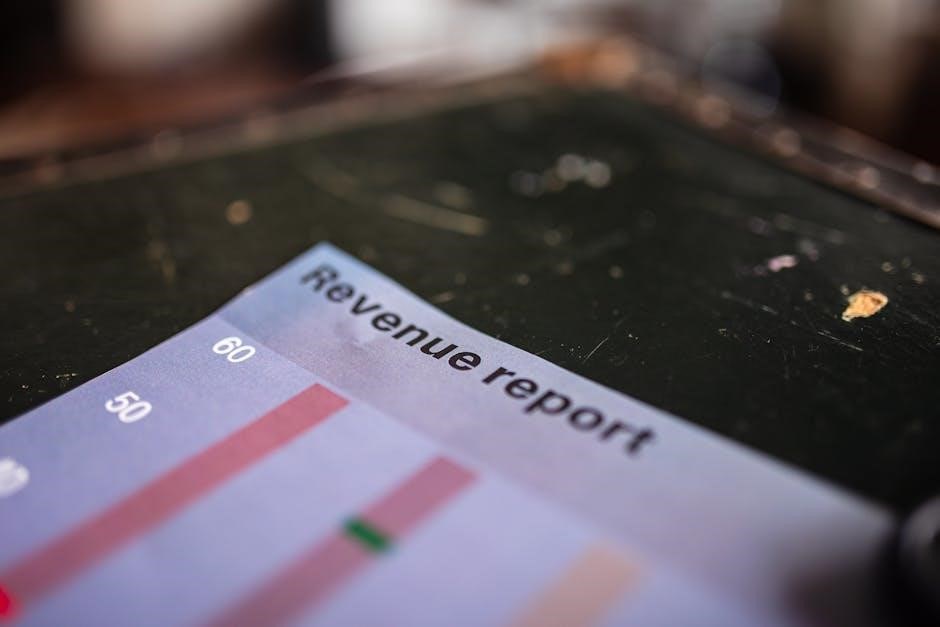Deep work is professional activity requiring sustained focus‚ free from distractions‚ enabling high cognitive performance and valuable output in a distracted world․
1․1 Definition of Deep Work
Deep work‚ as defined by Cal Newport‚ refers to professional activities performed in a state of distraction-free concentration‚ pushing cognitive capabilities to produce valuable output․ It involves focusing intensively on demanding tasks without interruptions‚ allowing for high levels of productivity and innovation․ This concept contrasts with shallow work‚ which entails routine‚ less intellectually demanding tasks․ In a world filled with distractions‚ deep work requires intentional effort to create environments conducive to sustained focus‚ enabling individuals to master complex information and deliver meaningful results․
1․2 Importance of Deep Work in a Distracted World
In a world overwhelmed by distractions‚ deep work is essential for producing high-value‚ intellectually demanding results․ It allows individuals to focus without interruption‚ fostering creativity‚ problem-solving‚ and innovation․ Without deep work‚ professionals risk being consumed by shallow tasks‚ leading to burnout and stagnation․ In a competitive economy driven by knowledge and innovation‚ deep work provides a competitive edge by enabling individuals to produce meaningful‚ high-quality output․ It is a critical skill for thriving in an era dominated by distractions and constant connectivity․

Key Concepts from Cal Newport’s Book
Cal Newport’s book introduces strategies to prioritize deep work‚ outlining rules to avoid distractions and embrace focus․ It emphasizes the value of uninterrupted concentration in a distracted world․
2․1 The Four Rules of Deep Work
Cal Newport outlines four rules to achieve deep work: Work Deeply by prioritizing focus and avoiding distractions‚ Embrace Boredom to build mental endurance‚ Quit Social Media to reduce unnecessary distractions‚ and Drain the Shallows by minimizing shallow tasks․ These rules help individuals create an environment conducive to concentration‚ enabling them to produce high-quality work and foster creativity and productivity in a world filled with distractions․
2․2 The Paradox of Deep Work in the Modern Workplace
The modern workplace often values collaboration and connectivity‚ yet these practices ironically hinder deep work․ While teams are encouraged to communicate constantly‚ this fosters a culture of distraction․ The paradox lies in the fact that deep work is essential for producing high-value results‚ yet it is increasingly difficult to implement in environments that prioritize instant responsiveness․ This tension between collaboration and focus creates a challenge for individuals and organizations seeking to balance productivity with the demands of a hyper-connected world․

Benefits of Deep Work
Deep work enhances productivity‚ fosters creativity‚ and provides personal fulfillment‚ leading to higher professional success and life satisfaction․
3․1 Increased Productivity
Deep work significantly boosts productivity by allowing individuals to focus without distractions‚ leading to higher quality output and faster task completion․ By eliminating interruptions‚ deep work sessions enable professionals to achieve more in less time‚ reducing errors and improving efficiency․ This focused approach contrasts sharply with the fragmented nature of shallow work‚ where constant switching between tasks diminishes productivity․ Regular deep work practice helps individuals develop concentration‚ enabling them to tackle complex challenges more effectively and deliver exceptional results consistently․
3․2 Enhanced Creativity and Problem-Solving Skills
Deep work fosters creativity and sharpens problem-solving abilities by allowing the mind to fully engage with complex challenges․ Uninterrupted focus enables the brain to explore new ideas and connections‚ leading to innovative solutions․ This cognitive immersion helps professionals think critically and approach problems from unique perspectives․ By minimizing distractions‚ deep work creates an environment where creativity can flourish‚ enabling individuals to produce groundbreaking ideas and solve intricate issues more effectively than in a fragmented work environment․
3․4 Personal Fulfillment and Job Satisfaction
Deep work contributes significantly to personal fulfillment and job satisfaction by allowing individuals to fully engage in meaningful tasks․ When professionals dedicate time to focused‚ high-impact work‚ they often experience a sense of accomplishment and pride in their output․ This aligns with their personal values and career goals‚ fostering a deeper connection to their work․ The psychological rewards of deep work‚ such as increased self-esteem and reduced stress‚ further enhance overall job satisfaction and create a more fulfilling professional experience․

The Four Rules for Focused Success
Cal Newport’s four rules—Work Deeply‚ Embrace Boredom‚ Quit Social Media‚ and Drain the Shallows—provide a framework for achieving focus and productivity in a distracted world․
4․1 Rule 1: Work Deeply
Rule 1 emphasizes focusing on mentally demanding tasks without distractions․ By setting clear goals and eliminating interruptions‚ individuals can engage in deep work‚ maximizing productivity․ This involves scheduling dedicated blocks of time for focused effort‚ allowing the brain to fully immerse in complex tasks․ Regular deep work sessions train the mind to concentrate better‚ leading to higher quality outputs and professional growth․ This rule forms the foundation for achieving focused success in a world filled with distractions․
4․2 Rule 2: Embrace Boredom
Embracing boredom is crucial for deep work‚ as it allows the mind to focus without constant stimulation․ In a world filled with distractions‚ boredom acts as a catalyst for concentrated thinking․ By resisting the urge to check notifications or scroll through social media‚ individuals can train their brains to tolerate periods of mental discomfort․ Over time‚ this builds the ability to engage in sustained‚ distraction-free focus‚ leading to higher productivity and better work quality․
4․3 Rule 3: Quit Social Media
Quit Social Media emphasizes the need to eliminate distractions that hinder deep work․ Social media‚ with its endless notifications and algorithm-driven feeds‚ fragments attention and reduces productivity․ Newport argues that even occasional use can create a mental itch‚ making sustained focus difficult․ By quitting‚ individuals reclaim time and mental energy‚ allowing them to engage in meaningful‚ uninterrupted work․ This rule challenges the notion that moderate social media use is harmless‚ advocating instead for a complete break to foster deep focus and professional growth․
4․4 Rule 4: Drain the Shallows
Rule 4: Drain the Shallows focuses on eliminating shallow tasks that consume time without adding value․ These include unnecessary emails‚ meetings‚ and busywork․ By reducing these distractions‚ individuals create space for deep‚ meaningful work․ Newport suggests scheduling shallow tasks in specific blocks and minimizing their frequency․ This rule helps prioritize depth over breadth‚ ensuring that professional efforts align with what truly matters․ It encourages a mindset shift toward valuing quality over quantity in work output․

Techniques for Implementing Deep Work
Implementing deep work requires intentional strategies like time blocking‚ the 4DX framework‚ and rituals to create a conducive environment for focused productivity and minimize distractions effectively․
5․1 Time Blocking
Time blocking involves scheduling deep work sessions in fixed‚ uninterrupted intervals‚ allowing individuals to focus without distractions․ By allocating specific time slots for tasks‚ productivity increases‚ and work quality improves․ This technique helps prioritize tasks‚ reduce procrastination‚ and create a structured routine․ To implement time blocking effectively‚ identify high-priority tasks‚ allocate dedicated blocks‚ and minimize interruptions during these periods․ Regularly reviewing and adjusting the schedule ensures alignment with goals and maintains effectiveness over time․
5․2 The 4DX Framework
The 4DX Framework‚ or “The 4 Disciplines of Execution‚” is a methodology designed to help individuals and organizations achieve their goals․ It emphasizes focusing on a few key objectives‚ tracking progress through lead measures‚ and maintaining accountability․ This framework aligns with deep work by encouraging concentrated effort on high-impact tasks․ By prioritizing wildly important goals and using a scoreboard to track progress‚ individuals can eliminate distractions and stay focused on what matters most‚ thereby enhancing their ability to engage in deep work effectively․
5․3 Rituals for Starting Deep Work
Establishing rituals for starting deep work helps signal to your brain that it’s time to focus․ These rituals could include activities like a morning walk‚ meditation‚ or a consistent pre-work routine․ The key is to create a transition that separates shallow tasks from deep work․ Examples include setting up a dedicated workspace‚ turning off notifications‚ or performing a quick planning session․ Such rituals help build discipline and mental clarity‚ making it easier to immerse yourself in focused work and maintain concentration over time․

Challenges to Deep Work
Common challenges include constant distractions‚ the cult of busyness‚ and the myth of multitasking‚ all hindering sustained focus and productivity in a hyper-connected world․
6․1 The Problem of Distractions
Modern work environments are filled with distractions‚ from notifications to endless meetings․ These interruptions fragment attention‚ reducing the ability to engage in deep work․ Technology‚ while useful‚ often becomes a double-edged sword‚ with social media and email pulling focus away․ Open offices and collaborative spaces‚ meant to foster teamwork‚ often create noise and interruptions․ Such distractions not only lower productivity but also degrade cognitive function‚ making it harder to enter states of deep focus․ Overcoming these requires intentional strategies to block out or limit distractions during work sessions․
- Notifications and digital interruptions are major culprits․
- Open-office layouts can hinder concentration․
- Strategies like time-blocking or noise-cancelling tools can help mitigate these issues․
6․2 The Cult of Busyness
In today’s fast-paced world‚ being “busy” is often worn as a badge of honor‚ creating a culture where constant activity is mistaken for productivity․ This cult of busyness leads to shallow work‚ as people prioritize being seen as busy over meaningful accomplishment․ Such behavior fosters stress and burnout‚ while hindering the ability to engage in deep‚ focused work․ Breaking free from this mindset requires valuing depth over breadth and recognizing that true productivity stems from concentrated effort‚ not endless activity․
- Busyness is often confused with real productivity․
- Constant activity prevents meaningful focus․
- Valuing depth over breadth is essential for deep work․
6․3 The Myth of Multitasking
Multitasking is often falsely believed to enhance productivity‚ but it undermines deep work by dividing attention and reducing focus․ Research shows that switching between tasks increases mental fatigue and decreases accuracy․ The brain can only process one complex task at a time effectively․ True productivity lies in concentrated effort‚ not in juggling multiple tasks simultaneously․
- Multitasking reduces focus and productivity․
- Switching tasks increases mental fatigue․
- The brain excels at one task at a time․
- Deep work requires uninterrupted concentration․

Case Studies and Examples
Explore real-world success stories of entrepreneurs and companies thriving through deep work‚ highlighting how focused practices drove innovation and productivity in competitive industries․
- Elon Musk’s intense focus on Tesla and SpaceX․
- Bill Gates’ “think weeks” for strategic planning․
- Google’s emphasis on uninterrupted work periods․
- Apple’s commitment to deep work in product design․
7․1 Successful Entrepreneurs Who Swear by Deep Work
Many high-achieving entrepreneurs attribute their success to deep work․ Elon Musk‚ for instance‚ is known for his relentless focus on complex problems at Tesla and SpaceX․ Similarly‚ Bill Gates famously conducts “think weeks‚” isolating himself to dive deep into strategic planning․ Steve Jobs’ ability to merge creativity with focused execution exemplifies deep work in action․ These leaders demonstrate how prioritizing uninterrupted‚ intellectually demanding tasks leads to groundbreaking innovation and sustained success in competitive industries․
- Elon Musk: Focused work on Tesla and SpaceX innovations․
- Bill Gates: Annual “think weeks” for strategic planning․
- Steve Jobs: Merging creativity with focused execution․
7․2 How Companies Can Foster Deep Work
Companies can create environments conducive to deep work by implementing specific strategies․ Establishing “focus times” where meetings are discouraged and interruptions minimized helps employees concentrate․ Providing private workspaces or quiet areas where distractions are controlled also supports deep work․ Encouraging time blocking and offering tools like website blockers can enhance productivity․ Additionally‚ fostering a culture that values deep work over constant busyness ensures employees feel supported in prioritizing focused tasks․ Regular training on deep work practices further reinforces this commitment to productivity․
- Implement “focus times” to reduce interruptions․
- Provide private or quiet workspaces․
- Encourage time blocking and offer productivity tools․
- Foster a culture valuing deep work over busyness․
- Provide regular training on deep work practices․

The Role of Technology
Technology can both enable and hinder deep work․ While tools like website blockers and focus apps support concentration‚ excessive screen time and digital distractions undermine productivity‚ requiring mindful management․
8․1 The Impact of Social Media on Deep Work
Social media profoundly disrupts deep work by creating constant distractions and fostering a culture of instant gratification․ Platforms are designed to capture attention‚ leading to fragmented focus and shallow work․ Notifications and endless scrolling create a state of continuous distraction‚ making it difficult to engage in meaningful‚ uninterrupted work․ The fear of missing out (FOMO) further exacerbates the problem‚ encouraging frequent checks that derail productivity․ To protect deep work‚ individuals must establish strict boundaries with social media‚ recognizing its detrimental impact on cognitive performance and creative output․
8․2 Tools to Enhance Deep Work
Various tools can help individuals maintain focus and minimize distractions during deep work․ Website blockers like Freedom and SelfControl restrict access to distracting sites‚ while apps like Focus@Will provide background music tailored to enhance concentration․ The Pomodoro Technique‚ implemented through tools like Tomato Timer‚ helps manage work intervals․ Additionally‚ noise-canceling headphones and ambient noise apps like Noisli create an optimal work environment․ These tools‚ when combined with discipline‚ can significantly enhance productivity and protect time dedicated to deep work․
Deep Work and Personal Development
Deep work fosters personal growth by cultivating habits of focus and discipline‚ leading to greater mental clarity‚ self-awareness‚ and overall life satisfaction through dedicated effort and purpose․
9․1 Building the Habit of Deep Work
Building the habit of deep work requires intentional routines and environments that eliminate distractions․ Start by scheduling dedicated blocks of time for deep work‚ ensuring consistency․ Gradually increase duration as focus improves․ Create rituals‚ like a pre-work routine‚ to signal the brain it’s time to concentrate․ Limit shallow tasks and replace them with meaningful‚ focused efforts․ Over time‚ this practice strengthens cognitive abilities‚ leading to improved productivity and personal growth․
9․2 Overcoming Procrastination
Overcoming procrastination requires addressing its root causes‚ such as fear of failure or perfectionism․ Breaking tasks into smaller‚ manageable steps reduces overwhelm․ Implementing time-blocking and eliminating distractions creates an environment conducive to focus․ Practicing the “Just Start” rule‚ committing to work for a short period‚ often builds momentum․ Regular deep work sessions train the brain to resist procrastination‚ fostering discipline and consistency over time․

Criticisms and Counterarguments
Critics argue deep work may isolate individuals or hinder collaboration․ Counterarguments emphasize its benefits when balanced with teamwork‚ proving its value in focused environments․
10․1 Critics of Deep Work
Critics of deep work argue that it can be overly individualistic‚ potentially isolating workers and undermining collaboration․ Some suggest it may not suit all professions or personalities․ Others argue that the strict elimination of distractions could stifle creativity or adaptability in dynamic environments․ Additionally‚ critics point out that deep work may not account for the value of serendipitous interactions or the need for constant learning in rapidly changing fields․ While the concept is compelling‚ its universal application remains debated․
10․2 Balancing Deep Work with Collaboration
While deep work emphasizes focused individual effort‚ collaboration remains essential for many industries․ Balancing the two requires intentional scheduling and communication․ Teams can allocate specific times for deep work‚ followed by collaborative sessions to share insights․ This hybrid approach ensures productivity while fostering innovation․ Leaders must encourage environments where both focused work and teamwork are valued‚ allowing individuals to recharge and contribute meaningfully․ By integrating these practices‚ organizations can maximize efficiency without isolating employees or stifling creativity․
Deep Work in Different Professions
Deep work enhances productivity across various fields‚ from writers creating focused content to software developers coding efficiently and academics conducting intensive research‚ fostering innovation and excellence․
11․1 Deep Work for Writers and Creatives
Writers and creatives thrive in deep work environments‚ as it allows for uninterrupted focus‚ fostering original ideas and high-quality output․ Novelists‚ journalists‚ and copywriters benefit from dedicated blocks of time to immerse in their craft․ By minimizing distractions‚ they can explore complex concepts and maintain creative flow․ Techniques like time blocking and isolation enable them to produce polished work efficiently․ Deep work helps creatives meet deadlines and deliver impactful results‚ making it indispensable for professions requiring innovation and precision․
11․2 Deep Work for Software Developers
Software developers greatly benefit from deep work‚ as it enables them to focus on complex coding tasks without interruptions․ By eliminating distractions‚ developers can fully immerse in problem-solving‚ leading to more efficient and error-free code․ Deep work allows them to tackle challenging algorithms and system designs with clarity․ Regular deep work sessions enhance productivity‚ reduce debugging time‚ and improve overall code quality․ This makes it essential for developers aiming to deliver high-performing and reliable software solutions in a fast-paced tech environment․
11․3 Deep Work for Academics and Researchers
Academics and researchers thrive in deep work environments‚ as it allows them to fully engage with complex theories‚ data analysis‚ and writing․ By minimizing distractions‚ they can immerse themselves in lengthy research sessions‚ leading to groundbreaking insights and high-quality publications․ Deep work fosters critical thinking and creativity‚ enabling researchers to synthesize information and produce innovative solutions․ Regular deep work sessions are essential for meeting tight deadlines and advancing knowledge in their respective fields‚ making it a cornerstone of academic success․
Deep work is a powerful practice to reclaim focus in a distracted world‚ fostering productivity‚ creativity‚ and personal growth while enhancing overall life satisfaction․
12․1 Summary of Key Takeaways
Deep work is a transformative approach to productivity‚ emphasizing uninterrupted focus to produce high-value work․ By prioritizing deep work‚ individuals can enhance creativity‚ problem-solving‚ and job satisfaction․ Cal Newport’s four rules—work deeply‚ embrace boredom‚ quit social media‚ and drain the shallows—provide a framework to minimize distractions and cultivate concentration․ Techniques like time blocking and rituals further support this practice․ Balancing deep work with collaboration ensures productivity without isolating teams․ Implementing these strategies fosters personal growth‚ professional success‚ and fulfillment in an increasingly distracted world․
12․2 Final Thoughts on Implementing Deep Work
Deep work is a journey requiring consistent effort and commitment․ Balancing focused work with collaboration ensures productivity while maintaining teamwork․ Leveraging tools like time-blocking and minimizing digital distractions enhances focus․ Regular reflection on habits and goals sustains progress and long-term success in a distracted world․

Resources for Further Reading
Explore the Deep Work PDF for a concise guide․ Discover Cal Newport’s other books and articles for deeper insights․ Utilize tools like Focus@Will to enhance focus․
13․1 The Deep Work PDF
The Deep Work PDF offers a concise summary of Cal Newport’s groundbreaking book․ It highlights key concepts‚ practical strategies‚ and actionable insights to cultivate focus in a distracted world․ The PDF serves as an essential guide for professionals seeking to enhance productivity and creativity․ It includes techniques like time blocking‚ the 4DX framework‚ and rituals for deep work․ Additionally‚ it provides real-world examples and tools to help individuals and organizations embrace deep work practices effectively․
13․2 Cal Newport’s Other Works
Cal Newport has authored several influential books beyond Deep Work․ Titles like So Good They Can’t Ignore You focus on career development‚ while Digital Minimalism explores mindful technology use․ A World Without Email tackles productivity by rethinking email culture․ These works complement Deep Work by addressing related themes such as focus‚ technology’s role‚ and workplace efficiency․ Newport’s writings collectively advocate for intentional practices to enhance personal and professional effectiveness in a hyper-connected world․
